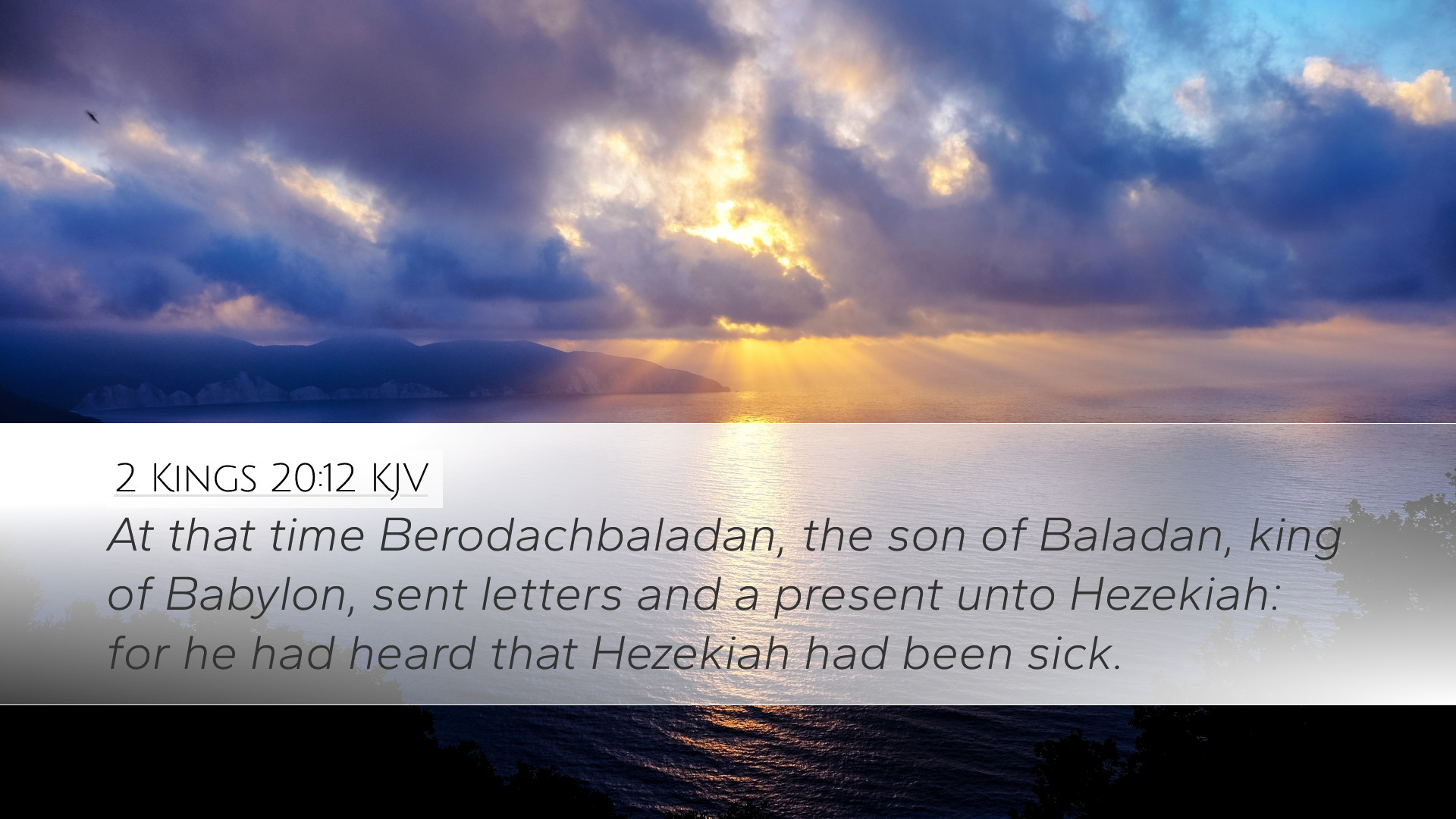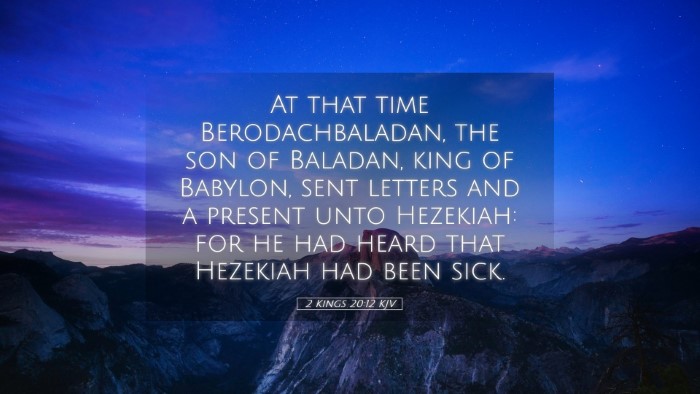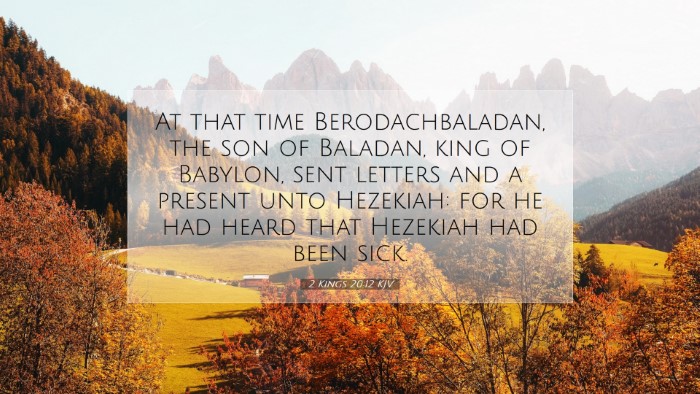Old Testament
Genesis Exodus Leviticus Numbers Deuteronomy Joshua Judges Ruth 1 Samuel 2 Samuel 1 Kings 2 Kings 1 Chronicles 2 Chronicles Ezra Nehemiah Esther Job Psalms Proverbs Ecclesiastes Song of Solomon Isaiah Jeremiah Lamentations Ezekiel Daniel Hosea Joel Amos Obadiah Jonah Micah Nahum Habakkuk Zephaniah Haggai Zechariah Malachi2 Kings 20:12
2 Kings 20:12 KJV
At that time Berodachbaladan, the son of Baladan, king of Babylon, sent letters and a present unto Hezekiah: for he had heard that Hezekiah had been sick.
2 Kings 20:12 Bible Commentary
Commentary on 2 Kings 20:12
Verse Context: 2 Kings 20:12 describes an important episode in the reign of King Hezekiah when he received gifts from the king of Babylon. This event unfolds in the context of Hezekiah’s miraculous healing and extended life. Understanding this verse requires insights into the historical, theological, and personal implications of Hezekiah's actions and the intentions of the Babylonian envoys.
Historical Background
Hezekiah was the thirteenth king of Judah and is noted for his religious reforms and efforts to eliminate idolatry. The events surrounding 2 Kings 20:12 take place after God miraculously heals Hezekiah from a severe illness, granting him an additional fifteen years of life. This healing prompted the Babylonian delegation to visit Jerusalem, drawn by the miraculous signs that accompanied Hezekiah's restoration.
Insights from Matthew Henry
Matthew Henry emphasizes the folly of Hezekiah's pride in showing off the treasures of his house to the Babylonian messengers. Henry notes that this act demonstrated a lapse in Hezekiah's faith and reliance on God. Instead of seeking alliances through showy displays, Henry argues that the king should have maintained humility and trust in divine providence.
- Pride and Vanity: Hezekiah's display of riches is a warning against pride. After experiencing God's favor, he allowed himself to be swayed by the affections of men rather than relying solely on God.
- Judgment as Consequence: Henry asserts that this incident foreshadows future troubles for Judah, as the very display that impressed the Babylonians would later be their downfall, leading to Israel's conquest.
Insights from Albert Barnes
Albert Barnes provides details on the nature of the envoys’ visit and highlights the significance of Babylon in the biblical narrative. Barnes discusses how the visit is not merely ceremonial but indicative of rising Babylonian power and ambition.
- Political Implications: Barnes points out that Hezekiah’s interaction with the Babylonians can be read as a political miscalculation. He warns against trusting in worldly powers rather than in God.
- Signs and Tokens: Barnes elaborates on the miraculous signs that accompanied Hezekiah’s healing and how these should have drawn the king back to a position of godly humility instead of pride.
Insights from Adam Clarke
Adam Clarke’s commentary builds on the theological implications of the verse. He draws attention to the spiritual lessons that Hezekiah's actions encapsulate, particularly the test of faith after restoration.
- Faith and Testing: Clarke asserts that after a profound experience of God’s grace, one is often vulnerable to pride and temptation. He notes how spiritual highs can precede significant trials and tribulations.
- Future Prophecy: Clarke also remarks on how the events following Hezekiah would lead to prophetic ramifications for the nation, prefiguring the Babylonian captivity initiated by the pride displayed in this encounter.
Theological Implications
The collective insight from these commentators serves as a sobering reminder of the dynamics between divine favor and human action. Hezekiah’s initial success and favor became his snare. The theological implications revolve around the themes of:
- Human Frailty: Even the most faithful leaders can stumble. This represents a warning for clergy and laity alike about the ease with which one can fall into complacency.
- Divine Sovereignty: God’s mercy towards Hezekiah is juxtaposed with a sovereign plan for judgment against Israel’s eventual idolatry. The tension between grace and accountability is apparent.
- Hope for Redemption: Despite the fallout from Hezekiah’s actions, there remains a basis for hope in God’s ultimate promise of restoration for His people, even in the face of judgment.
Personal Application
As pastors, students, and scholars reflect on 2 Kings 20:12, several applications emerge:
- Guarding Against Pride: Continuous vigilance against pride in ministry and life is crucial. Reminders of God’s grace should translate into humility.
- Understanding Consequences: Leaders must be cognizant that their actions may have far-reaching consequences, influencing future generations and the wider community.
- Faithfulness in Trials: The challenge remains to remain faithful during both highs and lows, recognizing the trials that often accompany substantial blessings.
Conclusion
2 Kings 20:12 serves as a pivotal moment in Israel's history, encapsulating themes of pride, divine interaction, and the consequences of leadership decisions. The insights drawn from Matthew Henry, Albert Barnes, and Adam Clarke underscore the need for humility and reflection in the face of God’s providential actions. As believers navigate their faith, this verse stands as both a warning and a beacon of hope, encouraging a posture of continual faithfulness and reliance upon God.


